( Aspects of this seem like deja vu - the protests remind me of those in Bahrain before the soldiers started using live ammo.... Also , I'm reminded of Egypt where police purposely shot at the eyes of protesters - is it a coincidence that we see eyes lost by Turks struck by gas canisters in the eye ? )
http://rt.com/news/turkey-protests-second-day-114/
Thousands of protesters on Taksim square after riot police withdrawal
Published time: June 01, 2013 13:50
Edited time: June 01, 2013 15:26
Edited time: June 01, 2013 15:26

Screenshot from AP video
Riot police in Istanbul are withdrawing from Taksim Square and allowing the mass protest to continue unabated, Turkish state media reports. Istanbul and Ankara are seeing a second day of violent protests, with tear gas and water cannons being deployed.
Minor scuffles broke out after protesters lobbed fireworks at officers as they were drawing back, the state-run Anadolu Agency reports. Police removed barricades around the square, located in the heart of the city, which had previously been erected to prevent the anti-government protests, Private Dogan news agency said.
Despite the authorities decision to allow thousands to flood onto the square, the main subway gateway to Taksim, the central station in the city's metro network, has reportedly been shut down in an effort to keep more people from reaching the ongoing protests.
Earlier the bridge over the Bosphorous Strait in Istanbul was blocked by thousands of protesters heading west from the eastern part of the city in an effort to reach the centrally located square, which has been cordoned off by police.
In the capital, Ankara, security forces battled with demonstrators who had amassed at a park near Prime Minister Recep Tayyip Erdogan's office. Rallies have also been staged in the cities of Bodrum, Konya and Izmir.
Confronted with the growing street opposition, Erdogan remained defiant, demanding that protesters “stop their demonstrations immediately."
"Police were there yesterday, they'll be on duty today and also tomorrow because Taksim Square cannot be an area where extremists are running wild," the PM warned.

Screenshot from AP video
On Monday, several dozen activists tried to stage a sit-in in Gezi Park, the last area of green space left on Taksim Square, after several trees were torn up to make way for a commercial redevelopment.
Erdogan dismissed the small protest on Wednesday, saying authorities would go ahead with the plan, which entails the construction of a replica Ottoman-era barracks that could house a shopping mall or apartments.
Following three days of police pressure, which saw officers douse peaceful protesters with pepper spray and tear gas, the sit-in attracted support from broad sections of Turkish society.
Erdogan dismissed the small protest on Wednesday, saying authorities would go ahead with the plan, which entails the construction of a replica Ottoman-era barracks that could house a shopping mall or apartments.
Following three days of police pressure, which saw officers douse peaceful protesters with pepper spray and tear gas, the sit-in attracted support from broad sections of Turkish society.

Screenshot from AP video
On Friday morning, riot police stormed the camp, deploying water cannons and tear gas, sparking the ongoing unrest. Human rights activists said hundreds were wounded as clashes raged on throughout the night.
The heavy-handed tactics deployed by police have been viewed by demonstrators as a sign of the government’s increasingly authoritarian bent, with the park demonstration turning into a broader, nationwide protest against Erdogan’s government.
Similar demonstrations have flared up around the country despite a court decision to temporarily halt demolition of the park.
Erdogan said that the Turkish Interior Ministry had launched an investigation into the use of excessive force by security forces. In a televised speech, the Turkish PM said police may have used tear gas excessively during their confrontation with protesters, although he insisted they did not represent the majority and were responsible for raising tensions.
However, protesters have countered the claim, saying the violent police crackdown is to blame for the recent unrest.
“This started simply as a peaceful sit-in to save a park, but it’s become one of the worst state attacks on protesters in recent memory -- and a frightening example of the Turkish government’s growing eagerness to crack down on its own citizens," an online petition demanding that Erdogan “End the crackdown now!” reads.
"The security forces have been individually targeting protesters to terrify, wound and kill us. 12 people have already suffered trauma injuries from gas canisters -- one man died of heart attack, and hundreds are suffering from excessive gas inhalation,” it continues.
http://www.juancole.com/2013/06/protests-accused-brutality.html
Taksim Square Protests in Turkey Spread to other Cities, Police accused of Brutality
Posted on 06/01/2013 by Juan Cole
Protests at Taksim Square in Istanbul that began by opposing the privatization of a park (one of the last spots of green in that part of the city) took on a different life when they were met with a disproportionate response by police. The authorities used water canon and fired tear gas at young people doing nothing more than peacefully rallying, injuring some 100, some seriously. Tear gas canisters are dangerous if launched into crowds. The latter began demanding that the prime minister, Tayyip Erdogan, step down. Dozens of young people were injured, and dozens more were arrested. As news of the protest in Istanbul spread on social media, rallies were staged in “Ankara, Bodrum, Konya and Izmir.” On Saturday morning, a crowd of protesters crossed the bridge over the Golden Horn from Sultanahmet, coming to Taksim Square to show support for the previous day’s rally. Taksim is said now to be cordoned off, and the bridges were closed. (There are also ferries for getting across).
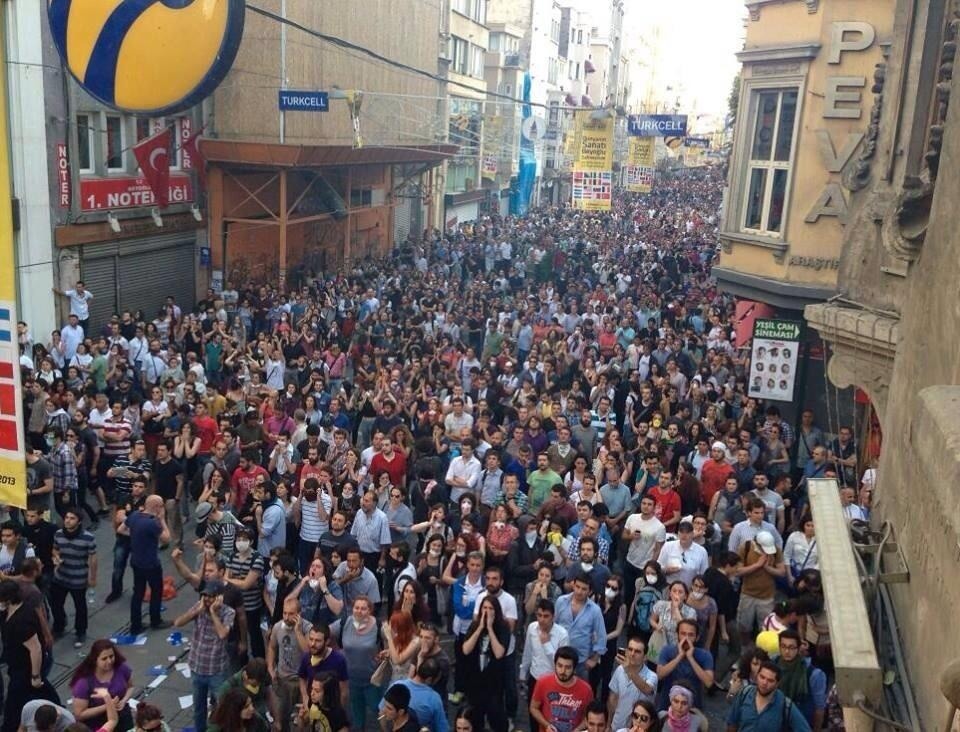
Amnesty International called for an inquiry into the disproportionate use of force by the police.
The government of Prime Minister Tayyip Erdogan was last elected in June, 2011, at which time his Justice and Development Party (AKP) received about half the votes in the country (an improvement on past performances). The elections appear to be on the up and up, and AK seems genuinely popular in the countryside and in many urban districts. The economy has grown enormously in the past decade under Erdogan’s rule, Turkey is now the world’s 17th largest economy (by nominal gdp) according to the IMF. It has been averaging 5 percent growth per year at a time when neighbors in the EU like Greece and Spain are basket cases. It has a huge tourism sector that has benefited from the troubles in Egypt, Tunisia and Lebanon. The economy will likely only grow 3% this year, but that is still a good number given Europe’s doldrums.
AK is a center-right party that has a slight religious tinge, and it has recently voted to restrict alcohol sales after 10 pm (alcohol is forbidden in Islam and AK views it as a public health problem rather as many Western governments look on cigarette smoking). Erdogan offended secularists by calling drinkers “alcoholics.” But this measure is among the few enacted by the AK Party that one could point to as influenced by Islam, and it is hardly Draconian, though a rather early last call.
The Justice and Development Party has also been criticized for calling for the fall of the government of Bashar al-Assad in Syria. But critics neglect to note that Erdogan repaired relations with al-Assad on becoming prime minister in 2003 and that in the 1990s the military government of Turkey had very bad relations with Syria. It was only once the Baath Party in Syria began murdering protesters in fair numbers that Erdogan decided that al-Assad would have to go. Recently leaders of the People’s Republican Party (devoted to the secular ideals of Turkey’s modern founding father, Mustafa Kemal Ataturk), Erdogan’s opposition, visited Damascus in a show of support for Bashar.
The young people protesting probably don’t care that much about either the early last call in Taksim’s bars or about the fate of Bashar al-Assad. Like all young people active in public spaces in conservative countries, they get hassled by the police. The protests were not mainly about the environment or retaining green parks but about police brutality. Turkey’s political tradition has never been particularly tolerant of dissent, and unfortunately the AKP is continuing in a tradition of crackdowns on political speech it doesn’t like.Reporters without Borders ranks the country 154 for press freedom, and it has 76 journalists in jail, and “at least 61 of those were imprisoned as a direct result of their work.” Observers are astonished to find that Saturday morning’s newspapers in Turkey are virtually silent about the protests. Editors have clearly been intimidated into keeping quiet about these events. A similar news blackout was apparently imposed after the border town of Rayhanliwhen it was bombed a couple of weeks ago. You can’t have a real, vibrant democracy without a free press.
My suspicion is that the protesters are leftists or the children of parents in the Republican People’s Party, who do not like Erdogan’s capitalist leanings nor his embrace of the religious Right as a prime constituency.
Although some on twitter were talking about Erdogan as a dictator and the protests as a Turkish spring, it doesn’t seem to me a good analogy. Erdogan has been repeatedly and fairly elected as prime minister. Unlike a Mubarak or a Ben Ali, he doesn’t run a police state and hasn’t blocked people economically. The protests appear to have been relatively small. The call for the fall of the government is undemocratic. If people don’t like Erdogan, they should campaign for his opponents in the next election.
On the other hand, freedom to assemble and freedom of the press were correctly thought by the American founding fathers to be key elements of democracy. By preventing peaceful assembly and deploying disproportionate force, and by an apparent imposed news blackout on the protests, the Turkish government is raising questions about how democratic the country really is.
http://www.todayszaman.com/news-317089-turkish-police-continue-crackdown-on-demonstrators-as-protests-spread.html
Turkish police continue crackdown on demonstrators as protests spread

Riot police use tear gas to disperse the crowd during a protest at Taksim Square in central İstanbul on May 31, 2013. (Photo: Reuters, Murad Sezer)
1 June 2013 / TODAYSZAMAN.COM, İSTANBUL
Police continued to clash with thousands of demonstrators in İstanbul and many other cities who took to the streets to protest government plans to demolish İstanbul's Gezi Park and the violent four-day crackdown on peaceful protests.
The protest grew out of anger at police's heavy-handed tactics to break up a peaceful sit-in to protect a park in İstanbul's central Taksim Square on Friday. It turned into a wider protest and spread to other Turkish cities. Dozens have been injured in the scuffles.
On Saturday, police clashed with several groups of youth trying to reach Taksim. Some threw stones at police.
Some 500 people marched along the Bosporus Bridge from Asian shore of the city, toward Taksim, on the European side, but were met with pressurized water and tear gas that filled the air in a thick haze of smoke.

There were clashes between protestors and police in İzmir throughout the night. Police said 92 people were detained during the crackdown.
In Ankara, people gathered in front of the Turkish Parliament building to protest the Gezi Park demolition. They threw stones and Molotov cocktails at the police, who used tear gas to disperse the crowd. There were also protests in Eskişehir, Muğla, Konya, Yalova, Antalya and Bolu throughout the night and on Saturday.
The main opposition Republican People's Party (CHP) cancelled a pre-scheduled rally in Kadıköy and said the party will join protests in Taksim.
Prime Minister Recep Tayyip Erdoğan's chief advisor İbrahim Kalın announced on his Twitter account on Saturday morning that İstanbul Mayor Kadir Topbaş will hold a meeting later in the day with representatives from the Taksim Gezi Park Platform and Chamber of Architects to find a solution to the park controversy.
The incidents had begun to turn violent by Thursday night, when hundreds of people joined protestors who had been camping for the past three days to stand guard against the demolition of the park's walls and the uprooting of trees in an act of solidarity.
The group was dispersed by riot police who arrived on the scene early on Friday with riot control vehicles and pepper spray.
The group resisted the police and clashed in sometimes violent incidents but had to leave the area when officers used tear gas and water cannons to break up the protest. Some reports said several protestors were injured when a wall they were climbing collapsed during a police chase, while several others were detained. Police attacked protestors once again in the afternoon with tear gas and pressurized water in Taksim Square and surrounding neighborhoods as well as the Harbiye and Gümüşsuyu quarters.
The excessive force used by police has drawn outrage and condemnation from various circles, including the European Union, which strongly condemned the police's treatment of the protestors.
At a press conference on Friday, İstanbul Governor Hüseyin Avni Mutlu said 63 people were detained and 12 were injured in the clashes. Yet, the figures dramatically rose overnight.
He asserted that he fully respects people's freedom of expression and that there is not a "tree massacre" at Gezi Park. Governor Mutlu claimed that there are certain groups trying to cause tension between the police and protestors to make it look as if police do not care about nature. “We certainly know these groups and their aims. We also know that they have nothing to do with love for nature,” he added.









http://www.guardian.co.uk/world/2013/jun/01/turkey-protests-second-day
Turkey protests rage for second day
Police use water cannon and teargas to disperse demonstrators as protest erupt for second day in Istanbul and Ankara
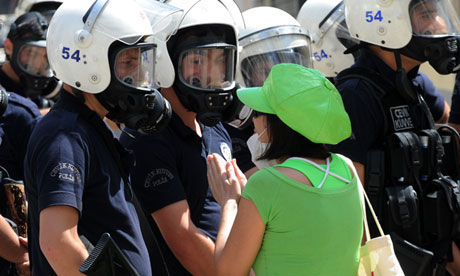
A woman confronts Turkish riot police during violent protests in Istanbul. Photograph: Bulent Kilic/AFP/Getty Images
Violent protests have continued for a second day in Turkey, with police and protesters clashing in Istanbul and the capital Ankara.
In Istanbul, thousands of protesters blocked the bridge over the Bosphorus as they marched from the east to the west side of the city to join demonstrations on Saturday morning.
The unrest began with a peaceful protest against the redevleopment of Gezi park in Istanbul's Taksim Square, but escalated as anger mounted at violent police tactics, including the use of teargas.
The demonstration turned into a wider protest against the country's prime minister, Recep Tayyip Erdogan, who is seen as becoming increasingly authoritarian, and spread to other Turkish cities.
The Turkish Doctors' Association said nearly 1,000 people had been injured in Istanbul on Friday, including six who lost eyes after being hit by gas canisters.
On Saturday, police clashed with several groups of youths trying to reach Taksim. Some threw stones at the security forces.
The marchers who crossed the Bosphorus bridge were met with water cannons and teargas. Police detained a group of protesters who ran into a hotel to shelter from the gas.
In Ankara, thousands gathered at a small park and moved into a popular shopping street. Many were seen drinking in the street in protest at the government restrictions on the sale and advertisement of alcohol. Police broke up groups that tried to march toward the parliament building, a few hundred metres away.
Ozturk Turkdogan, the head of the Turkish Human Rights Association, said hundreds of people in several cities had been injured in the police crackdown and a few hundred people had been arrested. The Dogan news agency said 81 demonstrators were detained in Istanbul.
Turkish police have previously been accused of excessive use of teargas and violence to stop demonstrations, including at this year's May Day rally.
Turkdogan said: "The use of [tear]gas at such proportions is unacceptable. It is a danger to public health and as such is a crime. Unfortunately, there isn't a prosecutor brave enough to stand up to police. The people are standing up against Erdogan who is trying to monopolise power and is meddling in all aspects of life."
There is resentment in secular circles towards Erdogan's broadly Islamic government and towards the prime minister himself, who is known for his abrasive style and intolerance of criticism.
Last week, the government passed legislation preventing the sale and advertisement of alcoholic drinks, alarming secularists. Many felt insulted when he defended the legislation by calling people who drink alcoholics.
Thousands marched through streets in several cities on Friday, calling on Erdogan to resign. Cars honked and residents banged on pots and pans in solidarity with the protesters.
http://www.aljazeera.com/news/europe/2013/06/20136162539347599.html
Fresh anti-government clashes hit Turkey |
Police fire tear gas and water cannons at demonstrators trying to march to Istanbul square during second day of unrest.
Last Modified: 01 Jun 2013 09:45
|
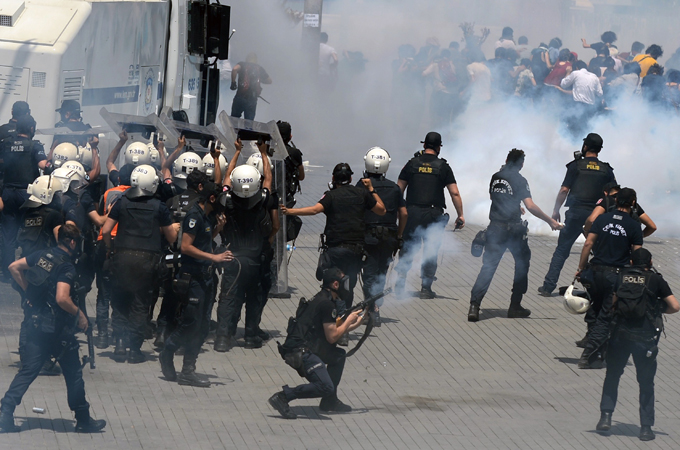
Riot police have pushed protesters back from Taksim Square [AP]
|
Police in Istanbul have fired tear gas and water cannons at protesters trying to reach a symbolic landmark during a second day of anti-government demonstrations.
Protesters chanted "unite against fascism" and "government resign" on Saturday as they tried to reach Taksim Square, which has long been a venue for political unrest.
Al Jazeera's Gokhan Yivciger reported that there were fierce clashes at police barricades in Harbiye district, about 2km from the square, with riot squads firing salvos of tear gas.
Police also quelled protests this morining in Besiktas neighbourhood, which is on the shores of the Bosphorus nearer to the square.
Saturday's violence came a day after scores of people were injured in clashes in central Istanbul, with 60 people detained around Taksim. Broken glass and rocks were strewn across a main shopping street near the square.
The protest at Taksim's Gezi Park began late on Monday after trees were torn up over a government redevelopment plan. It has now widened into a broader demonstration against what protestors see as increasingly authoritarian rule.
"The protesters are saying that this is not about trees anymore," said Al Jazeera's Rawya Rageh, reporting from Istanbul.
Growing disquiet
Kemal Kilicdaroglu, the leader of the main opposition Republican People's Party, called on Prime Minister Recep Erdogan to withdraw police from the Gezi Park area, and criticised Istanbul governor Huseyin Avni Mutlu over his handling of the situation.
"From now on, in reality, there is no governor in Istanbul", Kilicdaroglu said in a statement.
The unrest reflects growing disquiet at Erdogan's administration and his Islamist-rooted Justice and Development Party.
There have been protests against the government's stance on the conflict in neighbouring Syria, a tightening of restrictions on alcohol sales and warnings against public displays of affection.
However, Erdogan has overseen a transformation in Turkey during his decade in power, turning its economy from crisis-prone into Europe's fastest-growing.
Per capita income has tripled in nominal terms since his party rose to power.
He also remains by far Turkey's most popular politician, and is widely viewed as its most powerful leader since Mustafa Kemal Ataturk founded the modern secular republic on the ashes of the Ottoman Empire 90 years ago.
Turkey police fire tear gas at protestors

Turkish riot police use tear gas to disperse demonstrators during a protest in Taksim Square in central Istanbul on May 31, 2013.
Sat Jun 1, 2013 10:1AM GMT
0
Turkey’s police have fired tear gas to disperse demonstrators who were protesting against the government of Prime Minister Recep Tayyip Erdogan.
On Saturday, police clashed with protestors trying to reach Istanbul’s iconic Square Taksim for a second day of anti-government demonstrations. According to local media earlier in the day, despite police firing water canon, hundred protestors waving Turkish flags advanced and crossed the Bosphorus Bridge to the European side of the city to try to reach the main square. Some protestors hurled stones at police. According to Turkey's Dogan news agency, some 81 demonstrators were detained in Istanbul. Clashes were also reported in the Besiktas district. In Ankara, demonstrators tried to march on the parliament. The unrest erupted into anti-government demonstrations after police on Friday moved into Taksim to break up a peaceful sit-in protest against the razing of nearby park, wounding at least two dozen people. Witnesses said several protesters, including two opposition legislators, were hospitalized after being affected by the gas while two others were hospitalized after they were hit in the head by teargas canisters. A number of protesters were also injured after a wall they climbed collapsed during a police chase. Two protestors suffered broken arms and several others had minor bone fractures. Protesters have occupied Istanbul’s Gezi Park, near Taksim square, since May 28 to prevent bulldozers from uprooting the trees and demolishing the park in order to replace it with a shopping mall. Police have attacked the protesters several times in the past four days but they have refused to leave the park. On Thursday, riot police set fire to several tents and used teargas and pepper spray in a bid to force activists out of the park. The protesters say Gezi Park, which is a traditional gathering point for rallies and protests as well as a popular tourist destination, is the city's last green public space. Unconfirmed reports suggest more than 10,000 people have gathered in Gezi Park. YH/HN
http://rt.com/news/turkey-clashes-istanbul-park-067/
Riots, barricades, street battles as police fight protesters in Turkey (PHOTOS, VIDEO)
Published time: May 31, 2013 18:24
Edited time: June 01, 2013 09:57
Turkish protestors and riot policemen clash on June 1, 2013.(AFP Photo / Bulent Kilic)
The protests in Turkey have entered their second day Saturday morning, with thousands of demonstrators in Istanbul and Ankara being teargased and targeted with water cannons by police.
The Friday morning police crackdown on peaceful Occupy-style protesters rallying against the demolition of a landmark park in Istanbul, have over the day and night grown into massive street battles with police using teargas and water cannons against thousands of demonstrators and rioting spilling over to other Turkish cities, including the capital Ankara, and the Aegean coastal city of Izmir.
What started out as a protest against cutting down trees in the Istanbul Gezi Park turned into a broader demonstration against Prime Minster Tayyip Erdogan’s Islamist Justice and Development Party (AKP), which the demonstrators accuse of having grown increasingly authoritarian.
“This isn’t about trees anymore; it’s about all of the pressure we’re under from this government. We’re fed up; we don’t like the direction the country is headed in,” Mert Burge, an 18-year-old student, who came to support the protesters after he heard about the use of teargas via twitter, told Reuters.
At least 12 people including a pro-Kurdish MP and a Reuters photographer, suffered trauma injuries in the clashes. Six of the injured are suffering from serious head trauma. A 34-year-old Egyptian tourist is undergoing an operation after suffering a brain hemorrhage, Huseyin Demirduzen, from the Istanbul Medical Chamber board, told Reuters. Meanwhile a member of the opposition Peace and Democratic Party is in intensive care in a serious condition.
Hundreds more suffered respiratory problems due to the effects of tear gas, Demirduzen said. Several people were injured after a wall they were trying to climb in an attempt to get away from clouds of teargas collapsed underneath them.
In Ankara, police also used teargas to disperse protesters trying to reach the headquarters of the ruling Justice and Development Party (AKP) in support of the anti-government rioters in Istanbul.

A Turkish riot policeman uses tear gas as a demonstrator holds a banner which reads that, "Chemical Tayyip", referring to Prime Minister Tayyip Erdogan, during a protest against the destruction of trees in a park brought about by a pedestrian project, in Taksim Square in central Istanbul May 31, 2013. (Reuters / Murad Sezer)
The opposition Peace and Democracy Party described the police intervention as “state terror” in an emailed statement.
An Istanbul deputy of the AKP, Sirin Unal, tweeted his support of the police’s heavy-handed response.
“Obviously there are some people in need of gas. If you leave [Taksim Square] I hope you will have a good day, the system needs to be obeyed,” he wrote.
This vision is however not shared by Amnesty International, which said that it’s concerned with “the use of excessive force” by police after what started as a peaceful protest. The US State Department also appears unhappy with the number of injuries and is conducting its own investigation of the incident.
"We believe that Turkey's long-term stability, security and prosperity is best guaranteed by upholding the fundamental freedoms of expression, assembly and association, which is what it seems these individuals were doing," State Department spokeswoman Jen Psaki said.
Interior Minister Muammer Guler promised to investigate allegations of police having used disproportionate force against protesting crowds.
The protest at Gezi Park, next to Taksim Square, started on Monday after developers started tearing up trees, as part of the government plan to make way for a replica Ottoman army barracks and a shopping mall. Demonstrators say they defend the last green space of any size in the center of Istanbul.
Late Wednesday the main opposition leader, Kemal Kilicdaroglu from the Republic People’s Party (CHP) made a surprise visit to the protest camp of several hundred demonstrators and promised that members of his party would take turns to help the protesters stop an attempt to bring back the bulldozers.
In the first raid against crowds on Thursday, police used a Mass Incident Intervention Vehicle (TOMA) to disperse them before seizing and burning some of their tents, according to the Hurriyet Daily News.
On Friday evening, an Istanbul court ordered the temporary suspension of the project to uproot the trees in the Gezi Park.

Turkish riot police use water cannon to disperse demonstrators during a protest against the destruction of trees in a park brought about by a pedestrian project, in Taksim Square in central Istanbul May 31, 2013. (Reuters / Murad Sezer)
Tayyip Erdogan earlier defended the decision concerning the redevelopment of the Gezi Park, saying “Whatever you do, we’ve made our decision and we will implement it, we will revive history there.” Although the government has denied that the mall is part of the plan, insisting it needs the space to widen a nearby road and ease traffic congestion, according to RTE News.
Erdogan has said he wants to introduce an Ottoman cultural revival. As well as a more assertive foreign policy, more conservative policies are also being gradually introduced at home. He is also authorizing a slew of multi-billion dollar projects aimed at reflecting Turkey’s reemergence as a major power, including a third airport in Istanbul, which will be one the world’s biggest and a shipping canal as big as the Suez or Panama canals.
Turkey recently saw massive anti-government protests on May Day, when police clashed with tens of thousands of demonstrators in Istanbul, and there have been several smaller protests against tightening of alcohol sales and warnings against displays of public affection as well as the government’s stance on the neighboring Syria conflict.

Turkish protestors and riot policemen clash on June 1, 2013.(AFP Photo / Bulent Kilic)

Protestors clash with Turkish riot policemen on May 31, 2013.(AFP Photo / Gurcan Ozturk)

A demonstrator covers her face as riot police use tear gas to disperse the crowd during a protest against the destruction of trees in a park brought about by a pedestrian project, in Taksim Square in central Istanbul May 31, 2013. (Reuters / Murad Sezer)

Turkish riot police use water cannon to disperse demonstrators during a protest against the destruction of trees in a park brought about by a pedestrian project, in Taksim Square in central Istanbul May 31, 2013. (Reuters / Osman Orsal)

A demonstrator reacts as riot police use a water cannon and tear gas to disperse the crowd during a protest against the destruction of trees in a park brought about by a pedestrian project, in Taksim Square in central Istanbul May 31, 2013 (Reuters / Murad Sezer)

Riot police use tear gas to disperse the crowd during an anti-government protests at Taksim Square in central Istanbul May 31, 2013 (Reuters / Osman Orsal)

Demonstrators set fire to barricades as they clash with riot police during an anti-government protest at Taksim Square in central Istanbul May 31, 2013 (Reuters / Murad Sezer)

Protestors clash with Turkish riot policemen on May 31, 2013.(AFP Photo / Ozan Kose)
|
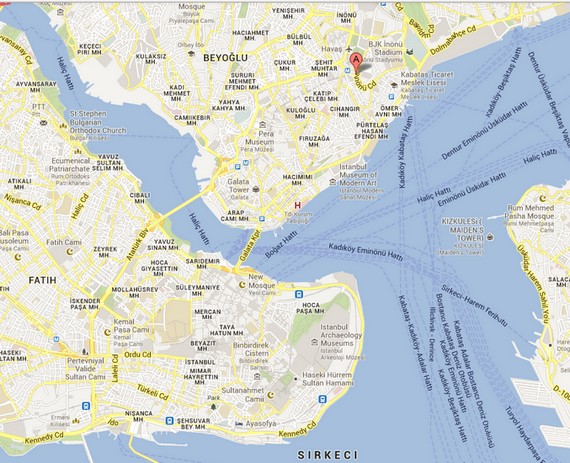








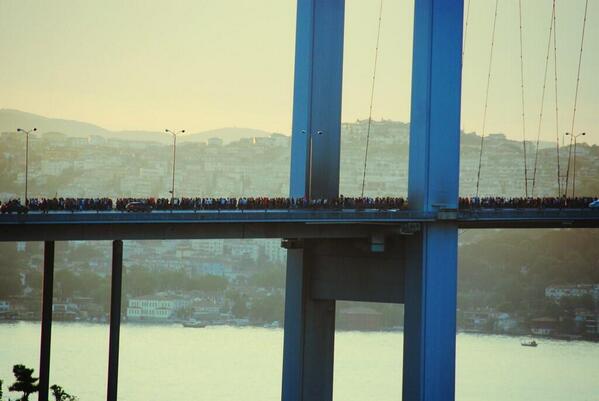






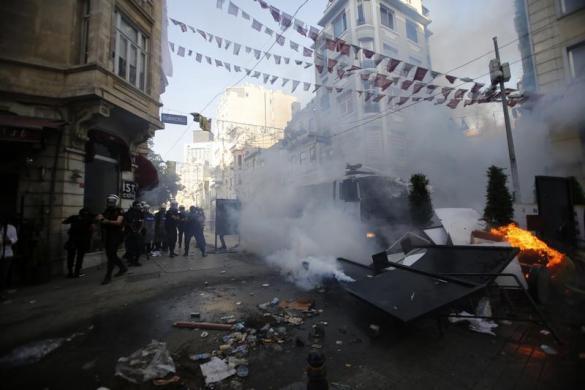

No comments:
Post a Comment